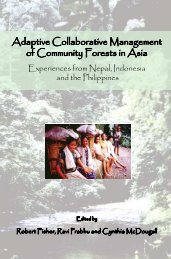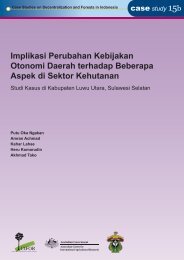Where the power lies: multiple stakeholder politics over natural ...
Where the power lies: multiple stakeholder politics over natural ...
Where the power lies: multiple stakeholder politics over natural ...
Create successful ePaper yourself
Turn your PDF publications into a flip-book with our unique Google optimized e-Paper software.
Annex 1.<br />
Mafungautsi Joint Forest Management Project, Gokwe District<br />
Mafungautsi Joint Forestry Management Project was selected as a site for <strong>the</strong><br />
development of <strong>the</strong> manual for a number of reasons. The first is that <strong>the</strong> project has<br />
been in existence for 10 years and <strong>over</strong> that period, <strong>the</strong> <strong>stakeholder</strong>s have interacted to<br />
varying degrees <strong>over</strong> <strong>the</strong> forest. Second, <strong>the</strong> project has been selected as an Adaptive<br />
Collaborative Management (ACM) site for <strong>the</strong> Center for International Forestry Research<br />
(CIFOR) to look at issues of <strong>stakeholder</strong> interaction at different decision making levels. On<br />
paper, Mafungautsi is a joint forest management project between <strong>the</strong> State forestry authority<br />
and <strong>the</strong> local communities residing on <strong>the</strong> edge of <strong>the</strong> forest. However, <strong>over</strong> <strong>the</strong> past ten<br />
years <strong>the</strong> project has included o<strong>the</strong>r <strong>stakeholder</strong>s. The development of <strong>the</strong> framework<br />
was undertaken as part of <strong>the</strong> process of:<br />
initiating <strong>the</strong> project;<br />
understanding local <strong>politics</strong> to improve strategic decisions about entry points for<br />
<strong>the</strong> ACM project;<br />
targeting <strong>the</strong> right partners;<br />
identifying current <strong>power</strong> relations and establishing <strong>the</strong> degree of involvement by<br />
different <strong>stakeholder</strong>s; and<br />
in particular, identifying <strong>the</strong> extent of wider participation by gender and o<strong>the</strong>r<br />
marginalized groups in <strong>the</strong> joint forest management project.<br />
At <strong>the</strong> time of <strong>the</strong> research, <strong>the</strong> ACM research team was only just completing its district<br />
level consultations among <strong>stakeholder</strong>s involved in <strong>the</strong> Mafungautsi Joint Forest Management<br />
Project. Thus <strong>the</strong> project presented an ideal case for analysing <strong>multiple</strong> <strong>stakeholder</strong> relations<br />
before implementation in this project, all <strong>the</strong> proposed steps of <strong>the</strong> framework have been<br />
applied.<br />
1.1 Defining <strong>the</strong> policy and legal context for <strong>multiple</strong> <strong>stakeholder</strong> groups<br />
Methods and process notes<br />
We conducted a review of g<strong>over</strong>nment publications and donor reports. There is a huge<br />
volume of literature on <strong>the</strong> state forests in Zimbabwe. An annotated list of this literature<br />
can be compiled as part of this excise and would be useful for future reference. We also<br />
interviewed some key officials in <strong>the</strong> g<strong>over</strong>nment (<strong>the</strong> project officer); <strong>the</strong> district forestry<br />
officer and a number of NGO researchers that had previously worked on <strong>the</strong> project.<br />
However, not all documents relevant to this part of <strong>the</strong> analysis are accessible to <strong>the</strong><br />
public. Officials were reluctant to pass on information and reports that were deemed<br />
‘sensitive’ to <strong>the</strong> project. In general, officials noted that information on contested state<br />
forests like Mafungautsi tends to be more difficult to use as it exposes some of <strong>the</strong><br />
contradictions in state policy about devolution and policing of <strong>natural</strong> resources. Some<br />
of <strong>the</strong>se documents, even when made available, could not be directly cited. We also<br />
interviewed some key respondents, including g<strong>over</strong>nment officials and researchers working

















